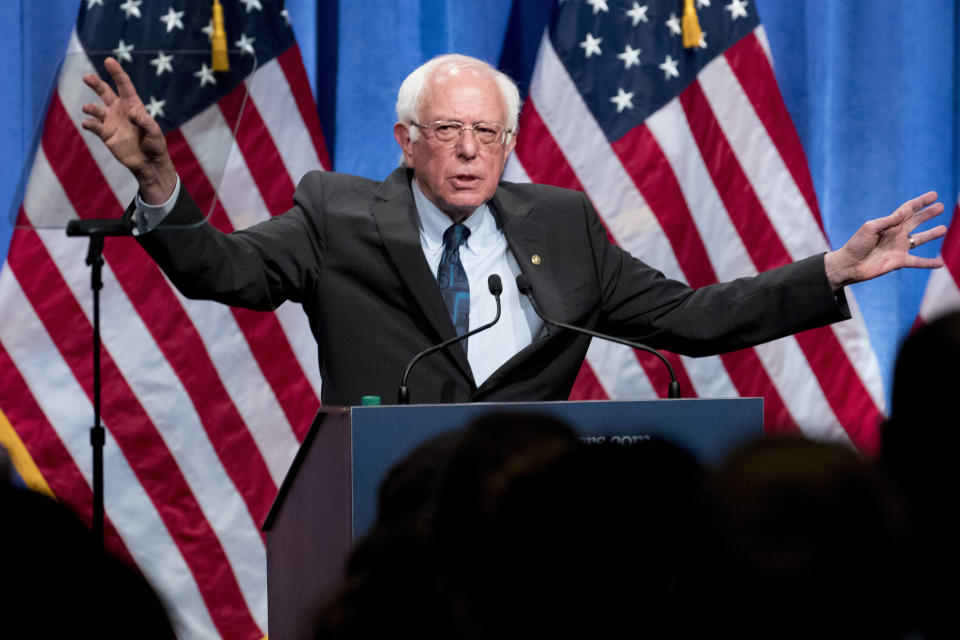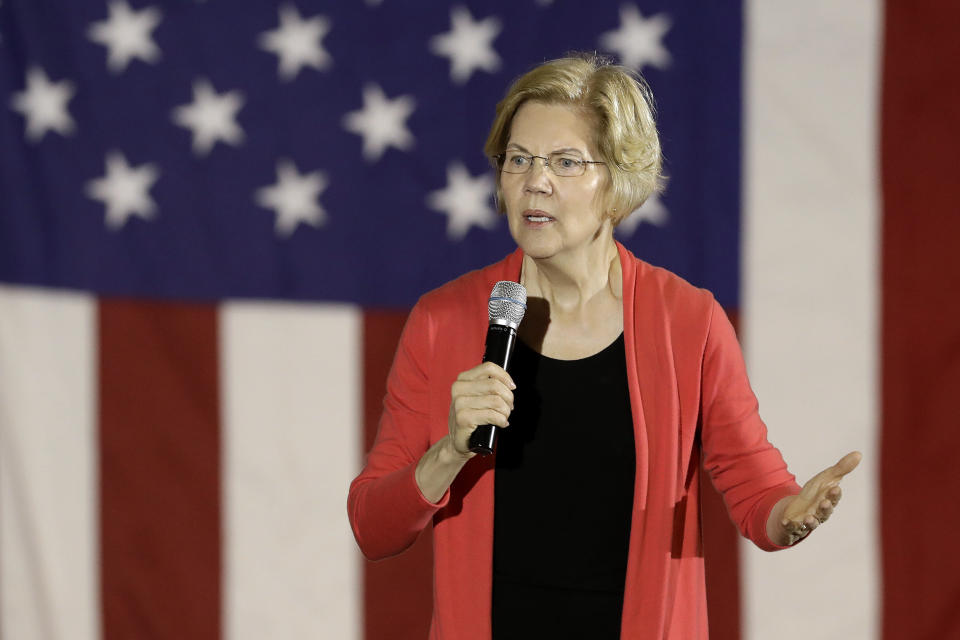Why Democratic Socialist Bernie Sanders Gave A Speech Explaining Democratic Socialism
When Sen. Bernie Sanders (I-Vt.) announced last week that he would be making a landmark speech on “democratic socialism” on Wednesday, reporters and Democratic campaign strategists collectively scratched their heads.
Why would a candidate give a major speech about an ideology for which his bona fides are already second to none?
After all, the voters who already identify with Sanders’ democratic socialist vision are almost certainly already aware that he is a professed adherent.
What’s more, Sanders already delivered a similar address in November 2015. He defined democratic socialism then in much the same way he did on Wednesday: As a completion of Franklin D. Roosevelt’s New Deal, which set out to house, educate and provide medical care to every American as a matter of right, but which never quite got there.
A Democratic campaign strategist, who is not now working for any presidential candidates, expressed agreement with the themes of Sanders’ speech but bafflement at the timing or function it served.
“I’m not exactly sure what the point of this speech at this moment is. It’s a speech out of nowhere,” said the strategist, who asked for anonymity for professional reasons. “And I think it’s reflective of the state of Bernie’s candidacy at this point. One of Bernie’s biggest challenges is advancing his message beyond 2016, and he seems incapable of doing that.”
The Sanders campaign insisted that the speech was not a response to a particular event or competition from any one candidate so much as a fresh opportunity to demystify democratic socialism, an ideology with which Sanders has genuinely identified for decades and would thus have to reckon with one way or another.
And unlike in 2015, when Donald Trump’s presidential election was still a distant possibility, Sanders could now frame his worldview as an antidote to the “same right-wing forces” that FDR successfully faced down.
Perhaps more important, Sanders now finds himself in a crowded field of Democratic presidential candidates, many of whom are laying claim to the progressive mantle that was his alone in the 2016 campaign.
Sens. Elizabeth Warren of Massachusetts, Kamala Harris of California, Cory Booker of New Jersey and Kirsten Gillibrand of New York have all voiced support on the campaign trail for single-payer health care, albeit with more caveats than Sanders.
Warren has matched his proposal for tuition-free college and upped the ante, with a plan to cancel the majority of student loans, which she would pay for with a 2% wealth tax.
Recently, the Massachusetts senator has begun to climb in the polls. A Des Moines Register poll that came out Saturday showed her just 1 percentage point behind Sanders among Iowa Caucus voters. And a Monmouth University survey of Nevada voters that came out Wednesday showed her overtaking Sanders for the first time in any poll. (Former Vice President Joe Biden leads the pack in nearly all polling of the first four primary states.)
At Warren’s largest rally to date, in Oakland, California, on May 31, a number of attendees told HuffPost they had voted for Sanders in the 2016 primary. The sisters Liz and Laura Beggs, who went to see Warren together, saw Sanders as the only progressive choice in 2016.
But with Warren in the race, Laura, a designer, said she could now match her progressive policy convictions, including support for “Medicare for All,” with her desire to elect a woman president.
“The field for too long has been dominated by white men,” she said. “I would just fucking love to see a woman in the Oval Office.”
Liz, a human resources professional, nodded in agreement. Sanders’ “policies have moved more mainstream, and so I don’t have to rely on him to find that.”

In the current environment, Sanders’ self-identification as a socialist allows him to distinguish himself from Warren, who proudly calls herself a capitalist.
Sanders campaign manager Faiz Shakir promoted the speech to his Twitter followers on Wednesday as “a speech you won’t hear any other candidate give.”
Democratic socialism has “been defined about him and for him, and he’s been basically taking it. He’s been prodded, he’s been ridiculed, he’s been copied,” said RoseAnn DeMoro, a top Sanders ally and former head of the National Nurses United labor union.
With the speech, DeMoro continued, “he’s going on the record” and articulating the worldview on his own terms.
“There are people who have progressive policies, but he’s the only genuine progressive,” she added. “He is of and about the movement, and that’s a big distinction.”
In fact, Sanders’ democratic socialism speech is in keeping with a rhetorical theme he has been honing for weeks now. At the California Democratic convention on June 2, and again at the Iowa Democratic Hall of Fame on Sunday, Sanders argued that there was “no middle ground” when it came to addressing the major challenges facing the country ― from health care and abortion rights to climate change and income inequality.
At the time, it was widely viewed as a jab at Biden, but it might just as easily have been directed at the broader field as well, which Sanders implies lacks his record of standing up for progressive policies.

“Part of their strategy right now is: ’Don’t settle for anything less than the genuine article,” said Brian Fallon, a former spokesman for Hillary Clinton’s 2016 presidential campaign who is staying neutral in the primary. “So they’re leaning into democratic socialism.”
There is a clear rationale for Sanders to try to consolidate his hold on the most left-wing elements of the Democratic primary electorate ― the types of voters who might be able to discern the kind of authenticity that DeMoro and others argue only Sanders possesses.
Since entering the race, Sanders’ share of the primary electorate has never reached the heights of support he earned in his head-to-head matchup with Clinton in 2016. He would ultimately receive about 43% of the total popular vote in that nomination contest.
In a fractured field, though, it’s not clear that Sanders would ever need to do so in order to prevail. Speaking to The Atlantic in April, Sanders’ campaign team laid out a plan in which he would hold on to just enough of his base to win Iowa and New Hampshire, perform respectably in South Carolina and ultimately win the primary with a 30% plurality.
That’s where continuing to burnish his credibility with the most hardcore left-wing Democrats could factor into Sanders’ long game.
“They’re trying to feed the red meat to maintain their floor” in the polls, said Fallon, who is now executive director of the progressive group Demand Justice.
But though it’s early, Sanders’ poll numbers, both nationally and in the early states, have begun to hover between 15% and 20%, keeping the path to 30% tentatively out of reach.
Sanders’ biggest challenge is with voters older than 30. As it stands, his support declines the older a voter gets. Among voters 65 or older, Sanders trailed Biden 53% to 9% in a mid-May poll conducted by Morning Consult.
Perhaps it’s no coincidence that younger Democrats are far more likely to view socialism favorably. A narrow majority of Democrats ages 18 to 29 have a positive view of socialism, according to Gallup; that figure drops to 28% among voters 65 or older.
But even Democrats who can abide socialism rarely use it as their primary identifier. A plurality of Democrats (21%) identifies as “Obama Democrats,” followed by “moderate Democrats” (18%), according to a February Harvard-Harris poll. Meanwhile, the poll found that just 4% of Democrats identify as “democratic socialists.”
Since by Sanders’ own admission his policies are consistent with the New Deal liberalism of FDR ― who did not identify as a socialist ― some analysts wondered why he would double down on the socialist branding, which remains less popular than the policies he advocates ― to say nothing of the New Deal itself.
Sanders is “not a socialist, he’s a New Deal Democrat,” Matt Stoller, a fellow at the antitrust policy-focused Open Markets Institute, wrote on Twitter. “He’s talking all about the New Deal and liberalism.”
Noting the unpopularity of “socialism” with older voters and other groups of Democrats who might otherwise be amenable to Sanders’ pitch, Mike Mikus, a Pittsburgh-based Democratic campaign consultant, called Sanders’ speech a “big mistake.”
“Everything he was doing today was explaining. And when you’re explaining, you’re losing,” Mikus said.
“A lot of the things he talks about are popular with the public. But ... there are a lot of voters, including a lot of voters who consider themselves fairly liberal, who don’t like the socialist label,” he added. “I would have said, ‘Labels are labels, and here’s what I’m actually for,’ and left it at that.”
Love HuffPost? Become a founding member of HuffPost Plus today.
Related Coverage
Julián Castro Is First 2020 Presidential Candidate To Visit Flint
Elizabeth Warren Is Winning Over Left-Wing Hearts In Iowa
Bernie Sanders Pitches ‘Democratic Socialism’ As Next Stage Of FDR's New Deal
This article originally appeared on HuffPost.

